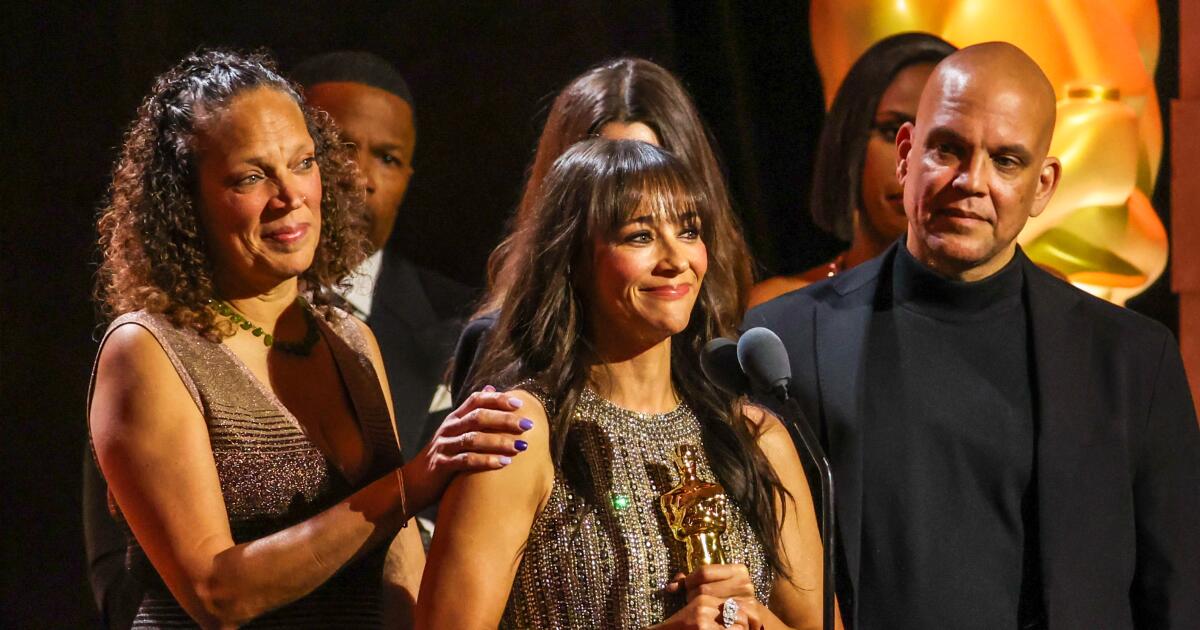Quincy Jones had already written his speech to accept an honorary Oscar this year at the motion picture academy’s annual Governors Awards.
But he died two weeks before Sunday’s ceremony, so it was left to his daughter Rashida Jones to deliver his words.
“He has so many friends in this room — well, actually, probably in every room, if I’m being honest,” Jones said, standing on stage with three of her siblings. Reading her father’s speech, which traced his dreams of creating music for film and to make “society and the world a more understanding and embracing place for us all to exist,” Jones was often overcome with emotion.
“In some ways, it was a difficult decision for our family to be here tonight, but we felt like we wanted to celebrate his beautiful life and career,” she said, following a presentation that included an introduction from Jamie Foxx and Jennifer Hudson leading a dozen gospel singers. “He imbued love into every single second of music he made. That was his real legacy.”
It was the most emotionally charged moment during the Governors Awards ceremony, an evening that presents the honorary Oscars that were once part of the televised Academy Awards and also serves as a campaign stop for contenders trying to capture what publicists call “face time” with academy voters.
On the latter front, the studios and streamers behind such high-profile awards season contenders as “Anora,” “The Substance” and “Emilia Pérez” ponied up $1,000 per ticket to attend the ceremony.
Jones, one of the most influential forces in modern American music, earned seven Oscar nominations in his lengthy career, mostly for his work on scores and songs, though he also picked up a nod as a producer of Steven Spielberg’s 1985 adaptation of “The Color Purple.” Jones received the Jean Hersholt Humanitarian Award in 1995, making this his second honorary Oscar.
Richard Curtis, who wrote the beloved romantic-comedies “Four Weddings and a Funeral” and “Noting Hill,” co-wrote the first “Bridget Jones’s Diary” and wrote and directed the polarizing “Love Actually,” a movie that has become a holiday perennial, won the Hersholt award this year.
The academy saluted Curtis or his tireless charitable work as a co-founder of Comic Relief, a producer of Red Nose Day and for his efforts to end world poverty through groups like Make Poverty History.
Hugh Grant, who starred in “Four Weddings,” “Notting Hill” and “Love Actually,” introduced Curtis, using his dry wit to recall the beginning of their creative partnership in “Four Weddings.”
“I went to the audition, and frankly, I was rather good, and it was lovely because the director, Mike Newell, liked me and wanted me, and the producer liked me and wanted me, and the money people wanted me. The only person who didn’t want me, and in fact, took such an instant and violent dislike to me that he did everything in his power to stop me from getting the part, was the writer. And it is this ass— who we honor tonight,” Grant said.
“Would we call it an Oscar?” Grant mused, wrapping up his speech. “It’s a kind of Oscar. It’s a better-than-nothing Oscar.” Addressing Curtis, Grant added that he hoped they’d work together one more time, perhaps on “Four Funerals and a Wedding.”
Accepting the award, Curtis good-naturedly returned the sentiments of Grant’s introduction.
“I was so intrigued how Hugh was going to turn his infamously unsatisfactory character in order to present me with this prize, and he did nothing,” Curtis said. “He’s never been able to act much and it would probably be beyond his scope.”
He encouraged anyone in the audience who has been sad the past couple of weeks to keep on believing. Noting that people often think his movies are glued together by pop songs, Curtis cited Queen and David Bowie’s collaboration “Under Pressure,” saying that “in dark times, the catalyst that will ultimately make the difference to most people will not be violence, will not be aggression, but love.”
Casting director Juliet Taylor received an honorary Oscar for a career spanning five decades. Taylor got her start on “The Exorcist,” discovering Linda Blair. Owning more than 100 credits, she cast Steven Spielberg’s “Close Encounters of the Third Kind” and “Schindler’s List,” Martin Scorsese’s “Taxi Driver,” James L. Brooks’ “Terms of Endearment,” Nora Ephron’s “Sleepless in Seattle” and 43 films for Woody Allen, including the Oscar-winning best picture “Annie Hall.”
She cited Allen as the “director who really changed my life with his loyalty and his support.”
“Working with him was a casting director’s dream because he was so open and so humble,” Taylor said, accepting the Oscar following a speech from Nicole Kidman. “I could feel free to throw out the most outlandish ideas, and Woody would just raise his eyebrows and go, ‘Uh-huh.’ And if he had an idea that I didn’t like, I could say, ‘Oh, Woody, that’s a terrible idea.’ And he would just laugh.”
James Bond series producers Barbara Broccoli and Michael J. Wilson received the Irving G. Thalberg Memorial Award, celebrating the work of producers. The duo, half-siblings, have produced nine Bond films, beginning with 1995’s “GoldenEye,” through their EON Productions. (The half-siblings’ father, producer Albert “Cubby” Broccoli, preceded them.)
“I’m deeply grateful and profoundly moved because I watched my father accept this award in 1981,” Broccoli said. “A farm boy who made good in Hollywood, this award was his most valued possession. My father was and will always be my North Star. Thank you, Daddy, for giving me the greatest life imaginable.”

